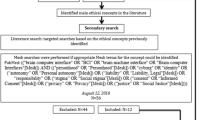Abstract
Important insights have been generated by ethicists, philosophers, sociologists, lawyers, and representatives from other disciplines regarding the ethics of neurotechnology in general and of brain-computer interfaces (BCIs) in particular. However, since (medical) BCIs have yet to leave the laboratory and the context of clinical studies and enter the “real” world, many important normative questions remain unanswered. In this paper we summarize the main lines of ethical inquiry regarding BCIs, both from the general academic discussion and with a view on the results gained in INTERFACES, an interdisciplinary project on the normative dimensions of BCIs. Furthermore, we offer our perspective on future research and argue that the ethics of technology should explore decision-making processes by which communities and societies regulate emerging technologies, such as BCIs.
Access this chapter
Tax calculation will be finalised at checkout
Purchases are for personal use only
Similar content being viewed by others
References
Vidal JJ. Toward direct brain-computer communication. Annu Rev Biophys Bioeng. 1973;2(1):157–80.
McFarland DJ, Wolpaw JR. EEG-based brain-computer interfaces. Curr Opin Biomed Eng. 2017;4:194–200.
Zander TO, Krol LR. Team PhyPA: brain-computer interfacing for everyday human-computer interaction. Periodica polytechnica electrical engineering and computer. Science. 2017;61(2):209–16.
Zander TO, Kothe C. Towards passive brain-computer interfaces: applying brain-computer interface technology to human-machine systems in general. J Neural Eng. 2011;8(2):025005.
Graimann B, Allison B, Pfurtscheller G. Brain-computer interfaces: a gentle introduction. In: Graimann B, Allison B, Pfurtscheller G, editors. Brain-computer interfaces: revolutionizing human-computer interaction. Berlin: Springer; 2010. p. 1–27.
van Gerven M, Farquhar J, Schaefer R, Vlek R, Geuze J, Nijholt A, et al. The brain-computer interface cycle. J Neural Eng. 2009;6(4):1–10.
Rao RPN. Brain-computer interfacing: an introduction. Cambridge: Cambridge University Press; 2013.
Chaudhary U, Birbaumer N, Ramos-Murguialday A. Brain–computer interfaces for communication and rehabilitation. Nat Rev Neurol. 2016;12(9):513–25.
Salisbury DB, Parsons TD, Monden KR, Trost Z, Driver SJ. Brain–computer interface for individuals after spinal cord injury. Rehabil Psychol. 2016;61(4):435–41.
Maksimenko VA, van Heukelum S, Makarov VV, Kelderhuis J, Lüttjohann A, Koronovskii AA, et al. Absence seizure control by a brain computer interface. Sci Rep. 2017;7(1):2487.
McFarland DJ, Daly J, Boulay C, Parvaz MA. Therapeutic applications of BCI technologies. Brain Comput Interfaces. 2017;4(1–2):37–52.
Blankertz B, Acqualanga L, Dähne S, Haufe S, Schultze-Kraft M, Sturm I, et al. The Berlin brain-computer interface: progress beyond communication and control. Front Neurosci. 2016;10:1–24.
Blankertz B, Tangermann M, Vidaurre C, Fazil S, Sannelli C, Haufe S, et al. The Berlin brain-computer interface: non-medical uses of BCI technology. Front Neurosci. 2010;4:198.
Burwell S, Sample M, Racine E. Ethical aspects of brain computer interfaces: a sco** review. BMC Med Ethics. 2017;18(60):1–11.
Pham M, Goering S, Sample M, Huggins JE, Klein E. Asilomar survey: researcher perspectives on ethical principles and guidelines for BCI research. Brain Comput Interfaces. 2018;5(4):97–111.
Nijboer F, Clausen J, Allison BZ, Haselager P. The Asilomar survey: stakeholders’ opinions on ethical issues related to brain-computer interfacing. Neuroethics. 2013;6(3):541–78.
Sample M, Sattler S, Blain-Moraes S, Rodríguez-Arias D, Racine E. Do publics share experts’ concerns about brain–computer interfaces? A trinational survey on the ethics of neural technology. Sci Technol Hum Values. 2020;45(6):1242–70. https://doi.org/10.1177/0162243919879220.
Graimann B, Allison B, Pfurtscheller G. Brain–computer interfaces: a gentle introduction. In: Graimann B, Pfurtscheller G, Allison B, editors. Brain-computer interfaces. Berlin: Springer; 2009.
Wolkenstein A, Jox RJ, Friedrich O. Brain-computer interfaces. Lessons to be learned from the ethics of algorithms. Clin Neuroethics Camb Q Healthc Ethics. 2018;27(4):635–46.
Kögel J, Jox RJ, Friedrich O. What is it like to use a BCI? – insights from an interview study with brain-computer interface users. BMC Med Ethics. 2020;21(1):2.
Gallagher S. Multiple aspects in the sense of agency. New Ideas Psychol. 2012;30(1):15–31.
Wegner DM. The illusion of conscious will. Cambridge: The MIT Press; 2002.
Steinert S, Bublitz C, Jox R, Friedrich O. Doing things with thoughts: brain-computer interfaces and disembodied agency. Philos Technol. 2019;32:457–82.
Mittelstadt BD, Allo P, Taddeo M, Wachter S, Floridi L. The ethics of algorithms: map** the debate. Big Data Soc. 2016;3(2):2053951716679679.
Wolkenstein A, Friedrich O. Novel challenges of consenting to brain-data collection and black-box algorithms in BCI use. Bioethica forum. 2019;12(1,2):38–43.
Friedrich O, Racine E, Steinert S, et al. An analysis of the impact of brain-computer interfaces on autonomy. Neuroethics. 2018. https://doi.org/10.1007/s12152-018-9364-9.
Bublitz C, Wolkenstein A, Jox RJ, Friedrich O. Legal liabilities of BCI-users: responsibility gaps at the intersection of mind and machine? Int J Law Psychiatry. 2019;65:101399.
Heath J, Moriarty J, Norman W. Business ethics and (or as) political philosophy. Bus Ethics Q. 2010;20(3):427–52.
Kuhlmann S, Stegmaier P, Konrad K. The tentative governance of emerging science and technology—a conceptual introduction. Res Policy. 2019;48(5):1091–7.
Simonis G. Technology governance. In: Simonis G, editor. Konzepte und Verfahren der Technikfolgenabschätzung. Wiesbaden: Springer Fachmedien; 2013. p. 161–86.
Hampshire S. Justice is conflict. Princeton: Princeton University Press; 2000.
Tyler TR. Why people cooperate. The role of social motivations. Princeton: Princeton University Press; 2011.
Bobocel RD, Gosse L. Procedural justice: a historical review and critical analysis. In: Cropanzano RS, Ambrose ML, editors. The Oxford handbook of justice in the workplace. Oxford: Oxford University Press; 2015. p. 51–87.
Ceva E. Beyond legitimacy. Can proceduralism say anything relevant about justice? Crit Rev Int Soc Pol Phil. 2012;15(2):183–200.
Acknowledgments
Work on this paper was funded by the Federal Ministry of Education and Research (BMBF) in Germany (INTERFACES, 01GP1622A) and by the Deutsche Forschungsgemeinschaft (DFG, German Research Foundation)—418201802. We would like to thank Dorothea Wagner von Hoff for proofreading the article, Meliz-Sema Kaygusuz and Bernadette Scherer for formatting.
Author information
Authors and Affiliations
Corresponding author
Editor information
Editors and Affiliations
Rights and permissions
Copyright information
© 2021 Springer Nature Switzerland AG
About this chapter
Cite this chapter
Wolkenstein, A., Friedrich, O. (2021). Brain-Computer Interfaces: Current and Future Investigations in the Philosophy and Politics of Neurotechnology. In: Friedrich, O., Wolkenstein, A., Bublitz, C., Jox, R.J., Racine, E. (eds) Clinical Neurotechnology meets Artificial Intelligence. Advances in Neuroethics. Springer, Cham. https://doi.org/10.1007/978-3-030-64590-8_6
Download citation
DOI: https://doi.org/10.1007/978-3-030-64590-8_6
Published:
Publisher Name: Springer, Cham
Print ISBN: 978-3-030-64589-2
Online ISBN: 978-3-030-64590-8
eBook Packages: MedicineMedicine (R0)




